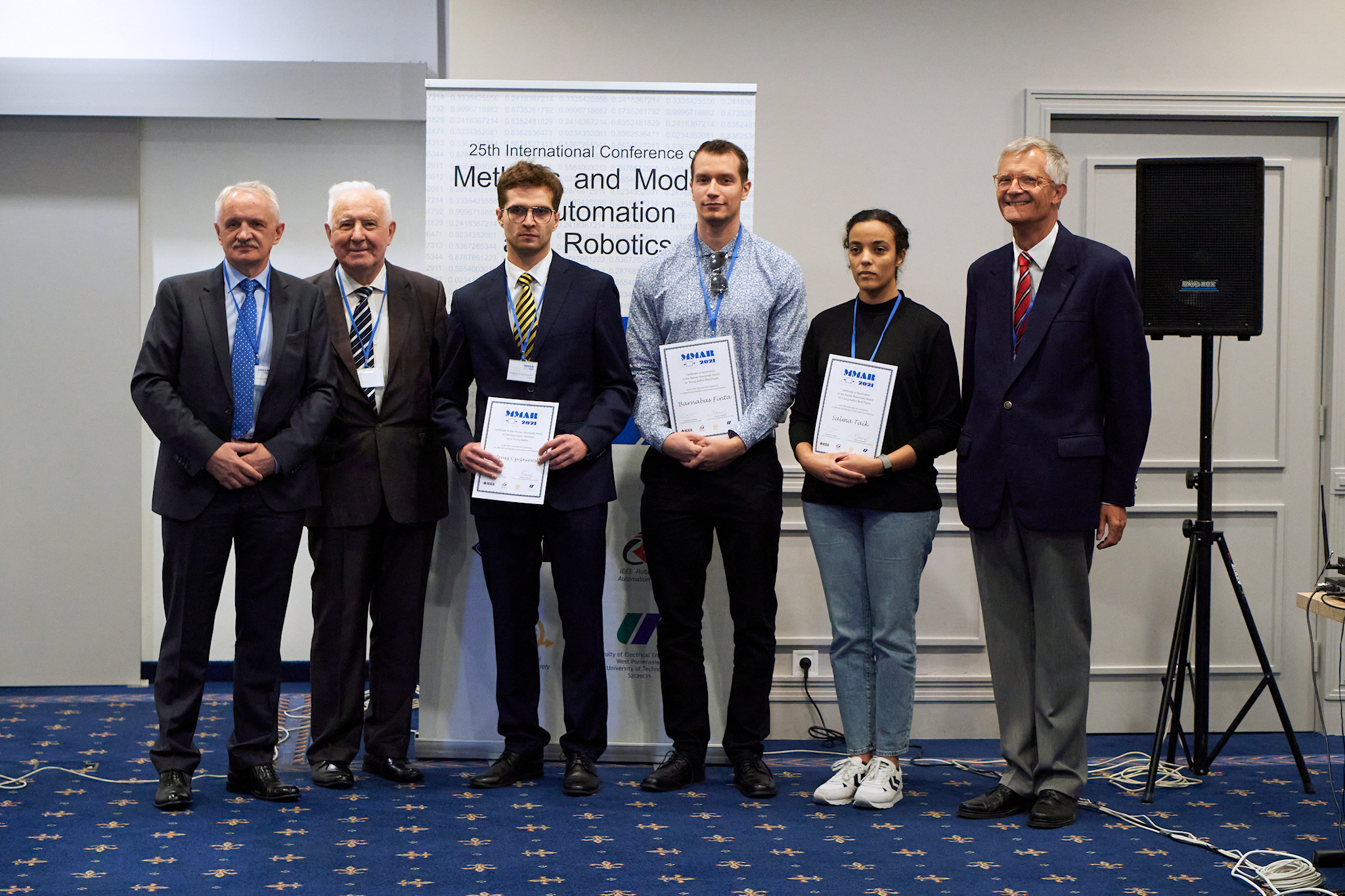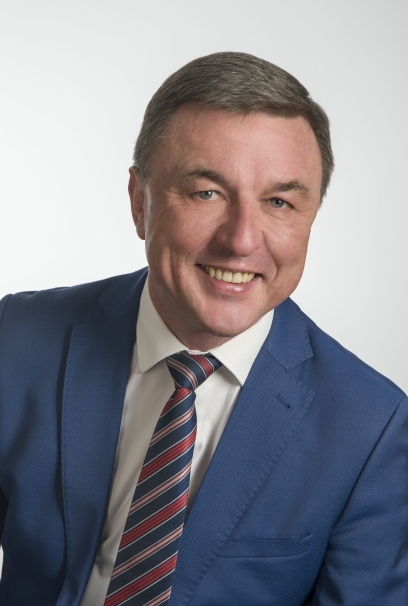MMAR 2021
MMAR 2021
Materials from the MMAR 2021:
 Full book of abstracts, with program Full book of abstracts, with program |
MMAR 2021 Young Author Prize
A total of 20 entries were submitted for the Young Author Best Paper competition this year. The IPC nominated for the prize Ms. Salma Taik of the Budapest University of Technology and Economics, and Mr. Barnabas Finta of the Budapest University of Technology and Economics, and Mr. Mateusz Czyżniewski of the Gdańsk University of Technology. The main prize went to Mr. Mateusz Czyżniewski of the Gdańsk University of Technology for the paper “A case study of robust sliding mode control applied to inverted pendulum on a cart”.
MMAR 2021 plenary lectures
| Dan Halperin Tel Aviv University, Israel From Snapping Fixtures to Multi-Robot Coordination: Geometry at the Service of Robotics. |
|
Joao Pedro Hespanha University of California, CA, USA Online Optimization for Output-feedback Control. |
|
Karl H. Johansson Royal Institute of Technology, Sweden Traffic Control Using Automated Truck Platoons: Distributed Sensing, Actuation, and Learning. |
|
Adam Czornik Silesian University of Technology, Poland Assignability of Numerical Characteristics of Discrete Time-varying Linear Systems. |
Dan Halperin
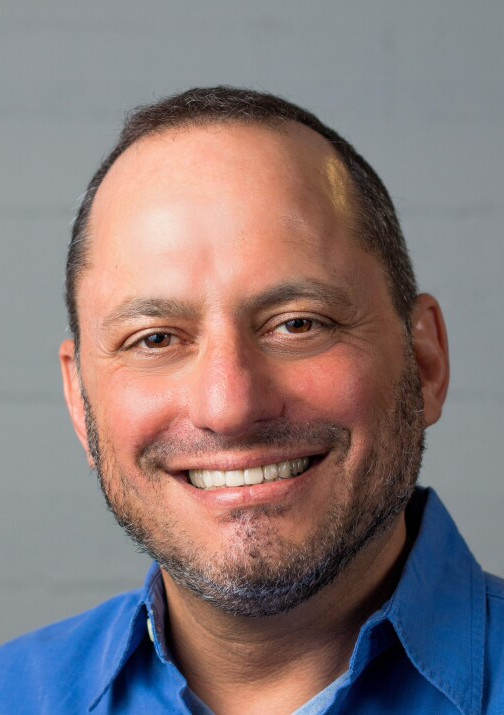 |
Dan Halperin received his Ph.D. in Computer Science from Tel Aviv University. He then spent three years at the Computer Science Robotics Laboratory at Stanford University. In 1996 he joined the Department of Computer Science at Tel Aviv University, where he is currently a full professor and for two years was the department chair. Halperin’s main field of research is Computational Geometry and Its Applications. Application areas he is interested in include robotics, automated manufacturing, algorithmic motion planning, and 3D printing. A major focus of Halperin’s work has been in research and development of robust geometric software, in collaboration with a group of European universities and research institutes: the CGAL project and library. Halperin was the program-committee chair/co-chair of several conferences in computational geometry, algorithms and robotics, including SoCG, ESA, ALENEX, and WAFR. Halperin is an ACM Fellow and an IEEE Fellow.
Halperin’s home page: |
Joao Pedro Hespanha
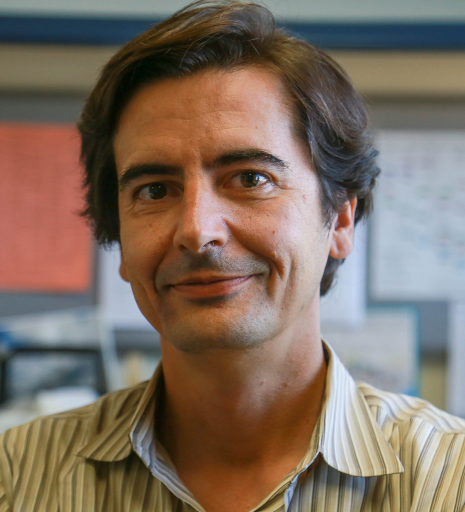 |
João P. Hespanha was born in Coimbra, Portugal, in 1968. He received the Licenciatura in electrical and computer engineering from the Instituto Superior Técnico, Lisbon, Portugal in 1991 and the Ph.D. degree in electrical engineering and applied science from Yale University, New Haven, Connecticut in 1998. From 1999 to 2001, he was Assistant Professor at the University of Southern California, Los Angeles. He moved to the University of California, Santa Barbara in 2002, where he currently holds a Professor position with the Department of Electrical and Computer Engineering.
Dr. Hespanha is the recipient of the Yale University’s Henry Prentiss Becton Graduate Prize for exceptional achievement in research in Engineering and Applied Science, a National Science Foundation CAREER Award, the 2005 best paper award at the 2nd Int. Conf. on Intelligent Sensing and Information Processing, the 2005 Automatica Theory/Methodology best paper prize, the 2006 George S. Axelby Outstanding Paper Award, and the 2009 Ruberti Young Researcher Prize. Dr. Hespanha is a Fellow of the International Federation of Automatic Control (IFAC) and of the IEEE. He was an IEEE distinguished lecturer from 2007 to 2013. His current research interests include hybrid and switched systems; multi-agent control systems; game theory; optimization; distributed control over communication networks (also known as networked control systems); the use of vision in feedback control; stochastic modeling in biology; and network security. |
Karl Henrik Johansson
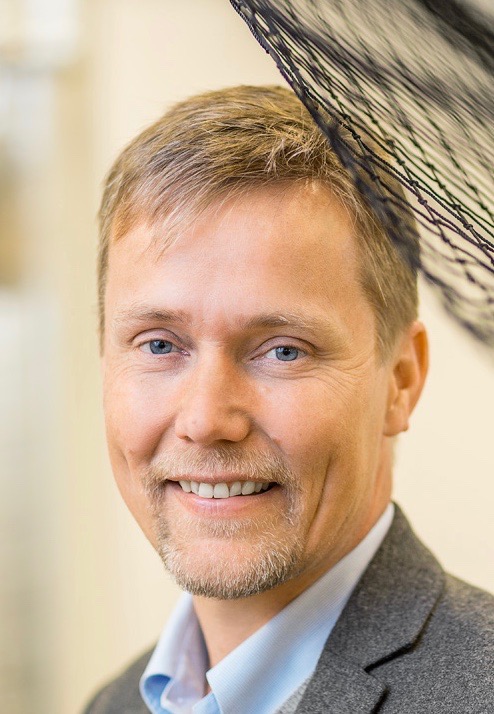 |
Karl H. Johansson is Professor with the School of Electrical Engineering and Computer Science at KTH Royal Institute of Technology in Sweden and Director of Digital Futures. He received MSc and PhD degrees from Lund University. He has held visiting positions at UC Berkeley, Caltech, NTU, HKUST Institute of Advanced Studies, and NTNU. His research interests are in networked control systems and cyber-physical systems with applications in transportation, energy, and automation networks. He is a member of the Swedish Research Council’s Scientific Council for Natural Sciences and Engineering Sciences. He has served on the IEEE Control Systems Society Board of Governors, the IFAC Executive Board, and is currently Vice-President of the European Control Association. He has received several best paper awards and other distinctions from IEEE, IFAC, and ACM. He has been awarded Distinguished Professor with the Swedish Research Council and Wallenberg Scholar with the Knut and Alice Wallenberg Foundation. He has received the Future Research Leader Award from the Swedish Foundation for Strategic Research and the triennial Young Author Prize from IFAC. He is Fellow of the IEEE and the Royal Swedish Academy of Engineering Sciences, and he is IEEE Control Systems Society Distinguished Lecturer. Johansson’s home page: https://people.kth.se/~kallej/ |

